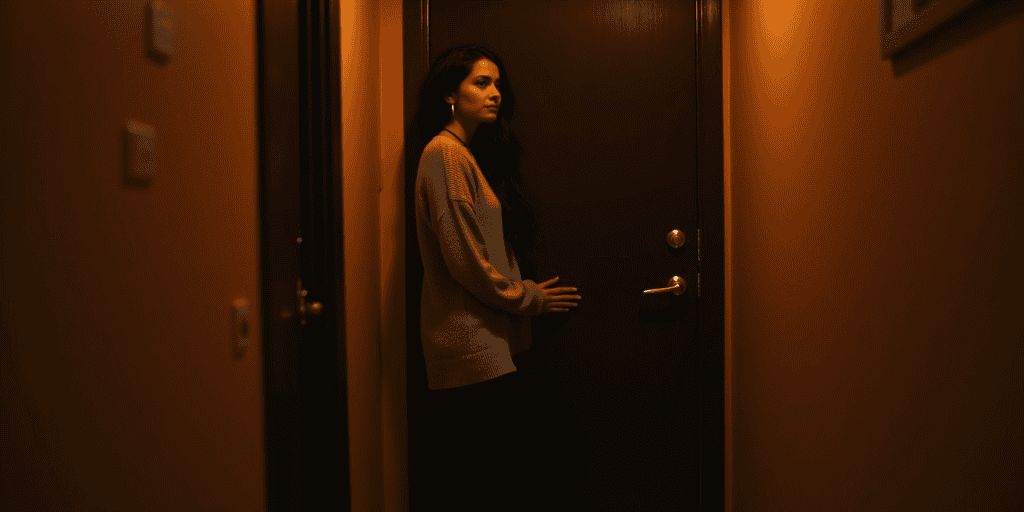There was a time I thought if I just asked “why” enough, eventually my mother would tell me the truth.
Why did she lie about me to our relatives?
Why did she pretend everything was fine when it clearly wasn’t?
Why did it seem like she cared more about how things looked than how I actually felt?
I was so desperate to understand that I believed if I just found the right way to ask.
If I just explained my hurt clearly enough, she would finally get it. She would finally care.
But she never did. And the more I asked, the more lost and broken I became.
Asking “why” felt like reaching for a life preserver, but every time, it was just another anchor pulling me deeper.
If you’re stuck asking “why” to a narcissistic parent, sibling, or family member, I promise you, by the end of this, you’ll finally let that question go.
And you’ll feel damn good about it.
Table of Contents
Why “Why?” Feels Like a Reasonable Question (But Isn’t)?

When you grow up in a dysfunctional family where your feelings are routinely dismissed, asking “why” becomes survival.
It’s how you try to make sense of chaos that doesn’t make sense.
As a child or even as an adult, you instinctively believe that if you could just understand, you could fix it.
Closure, reason, explanation… that’s what we’re after when we ask “why.”
I remember countless nights after family gatherings, sitting alone, replaying everything in my mind.
The way my narcissist older sister ignored me. The way my mother praised everyone else and acted like I didn’t exist.
I asked myself over and over:
Why don’t they care? Why am I always the target? What did I do wrong?
Eventually, I asked them directly.
My sister looked bored and muttered, “You’re so sensitive.”
My toxic and self-centered mother smirked and said, “You just love playing the victim.”
Those answers weren’t answers at all. They were weapons.
In that moment, I realized something painful but powerful: “Why” wasn’t a bridge to connection. It was a trap.
Narcissists don’t use “why” to reflect. They use it to deflect, dismiss, and confuse.
When you ask “why,” you aren’t getting closer to the truth, you’re just getting tangled deeper in their web.
What You’re Really Asking When You Ask “Why?”
In the beginning, I thought asking “why” would bring understanding.
If I asked calmly and kindly, maybe my mother or sister would care enough to explain.
But over time, I realized I wasn’t asking for reasons, I was begging for validation. I wanted them to see my pain.
Narcissists don’t offer that. They use “why” to tighten their grip, not to create connection.
“Why” = Please Validate Me
When I used to ask my mother why she favored my brother over me, what I really wanted was for her to say, “You’re right. It wasn’t fair. I’m sorry.”
Spoiler: That apology never came.
Instead, she’d scoff, roll her eyes, or turn it around:
“You’re always so jealous. Maybe if you weren’t so sensitive, you’d be easier to love.”
The more I begged for validation, the more ammunition I handed her.
“Why” = I Still Think You Might Care

Even when you’ve been hurt 100 times, there’s that small hopeful part inside you that still thinks, Maybe they didn’t mean it. Maybe deep down, they care.
I clung to that hope for years.
Every phone call, every family gathering, every emotional conversation where I asked, “Why would you say that about me?” was just another attempt to wake up someone who didn’t want to wake up.
Hope kept me trapped.
Psychologists describe this attachment as a ‘trauma bond‘, where hope and pain become tightly intertwined, making it hard to walk away.
“Why” = Maybe It’s My Fault
Sometimes, asking “why” was a way to try and fix myself.
“Maybe if I understand why Mom ignores me when I need help, I can be better next time.”
The truth? There was no fixing myself because I was never broken to begin with.
Narcissists feed off your self-doubt. Asking “why” feeds that beast.
3 Dangerous Things That Happen When You Ask Narcissists “Why?”
It took me years to see how harmful asking “why” really was.
I thought I was being mature, trying to talk things out.
But every time, I ended up confused, blamed, or shut down.
Narcissists don’t see “why” as a chance to resolve.
They see it as a golden opportunity to gaslight, hurt, and regain control over you.
Here’s what it does:
They Gaslight You Into More Confusion
I once asked my aunt (who was my mother’s younger sister) why she told my cousins that I was “ungrateful and selfish,” even after I was helping her financially.
Her response?
“I never said that. You’re making things up again. No wonder nobody wants to be around you.”
I started to doubt my own memory.
Maybe I was imagining things. Maybe it was my fault. Maybe I’m the problem.
This is gaslighting at its finest, and asking “why” opens the door for it.
They Weaponize Your Pain Against You

Every time you show a narcissist that you’re hurt, confused, or searching for answers, they stash that information away like a weapon.
Later, when they want to hurt you or control you, they pull it out.
When I confided in my brother once about how lonely I felt at family gatherings, thinking maybe it would bring us closer, he used my words months later during an argument:
“Nobody likes you anyway. You said it yourself.”
That was the last time I handed my pain over like that.
They Get What They Want: Control and Supply
When you ask “why,” you’re handing them control.
You’re staying engaged in narcissist’s game.
You’re spinning in confusion while they sit back and enjoy the chaos.
Every confused text I sent.
Every emotional voicemail I left. Every teary phone call asking for explanations.
I thought I was seeking connection.
They saw it as confirmation that they still had power over me.
What To Ask Yourself Instead?

Letting go of “why” was hard, but necessary.
After endless disappointments, I realized the answers wouldn’t come from them.
That’s when I began asking better questions.
Shifting the focus back to myself gave me the clarity that they never would.
“What patterns am I seeing?”
My narcissistic mother didn’t just have one bad day.
My toxic sister didn’t just forget one birthday.
My aunt didn’t just make one offhanded remark.
There were patterns. Clear, painful patterns.
When I stopped making excuses and started connecting the dots, the truth became impossible to ignore.
“What would I tell a friend in my shoes?”
If a friend told me their sister ghosted them, belittled them, and twisted their words constantly, would I say, “Maybe you should try harder to understand her?”
Nope, not interesed! I’d tell them to run!!
Start treating yourself with the same fierce loyalty you give others.
“What boundary needs to happen now?”
Not, “How can I fix them?”
Not, “How can I make them understand?”
The real question is: “What do I need to do to protect my peace?”
Maybe that’s low contact. Maybe it’s no contact.
Maybe it’s saying, “I will no longer explain myself to people committed to misunderstanding me.”
My Turning Point: When I Finally Let Go of “Why”?

The last time I asked my mother “why” was after a family holiday dinner.
She had spent the evening praising my brother’s job, his house, while barely making eye contact with me.
When I finally asked her, quietly, “Why do you treat me like I’m invisible?” she laughed and said, “Oh, don’t be so dramatic. You always want to be the victim.”
I felt like someone punched me in the stomach.
That was the moment it clicked:
I wasn’t going to get my closure.
I wasn’t going to get the apology.
I wasn’t going to get the “aha” moment where she suddenly loved me the way I deserved.
And you know what? It hurt like hell.
But it also set me free.
I stopped asking why.
I started setting boundaries.
I started loving the version of me that didn’t need their permission to be worthy.
And for the first time, I found peace.
Quick Recap And Key Takeaways
- Narcissists do not answer “why” honestly. They twist, deflect, and gaslight.
- Asking “why” keeps you emotionally hooked and gives them more power.
- Every “why” is interpreted by them as weakness and fuel for their control.
- You won’t find healing in their explanations, only more confusion.
- The truth is already visible in their patterns and repeated actions.
- Your peace comes when you stop asking them and start asking yourself better questions.
- Boundaries, not answers, are what will finally set you free.
The moment you stop needing them to explain themselves is the moment you begin to take your power back.
You no longer need their validation to heal.
You don’t need their clarity to move forward.
You only need to trust what you’ve already seen and decide that protecting your peace is the priority now.
The “why” doesn’t matter anymore.
You do.
Final Thoughts
I spent years begging for answers from people who only gave me pain.
Every “why” I asked was another way I handed them power over me.
The day I stopped asking and started listening to what their patterns had already shown me was the day everything changed.
That’s what The Next Chapter is about. It’s not about getting closure from a narcissist. It’s about giving closure to yourself.
If you’re ready to stop spinning in confusion and start building peace that doesn’t depend on anyone else, this is your sign.
You don’t need answers. You need your power back.
Related Posts:
- My 5 Unconventional Tips To Deal With Narcissists When No Contact Isn’t An Option
- Why Narcissists Love to See You in Pain?: How I Stop Giving Them That Power
- How Narcissistic Family Trauma Impacts Your Ability To Trust Others?
- This Is Why Narcissists Act Like They Don’t Understand, When They Clearly Do!
- One Rule That Ended My Victim Mindset And The Narcissist’s Power Forever




